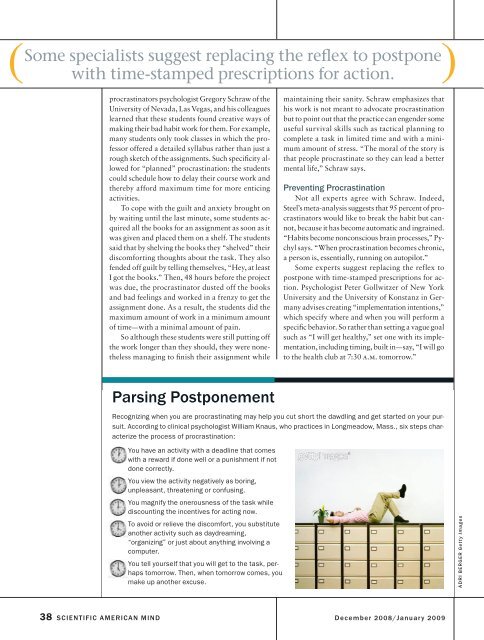Tomorrow - Trisha Gura
Tomorrow - Trisha Gura
Tomorrow - Trisha Gura
You also want an ePaper? Increase the reach of your titles
YUMPU automatically turns print PDFs into web optimized ePapers that Google loves.
( Some specialists suggest replacing the reflex to postpone )<br />
with time-stamped prescriptions for action.<br />
procrastinators psychologist Gregory Schraw of the<br />
University of Nevada, Las Vegas, and his colleagues<br />
learned that these students found creative ways of<br />
making their bad habit work for them. For example,<br />
many students only took classes in which the professor<br />
offered a detailed syllabus rather than just a<br />
rough sketch of the assignments. Such specificity allowed<br />
for “planned” procrastination: the students<br />
could schedule how to delay their course work and<br />
thereby afford maximum time for more enticing<br />
activities.<br />
To cope with the guilt and anxiety brought on<br />
by waiting until the last minute, some students acquired<br />
all the books for an assignment as soon as it<br />
was given and placed them on a shelf. The students<br />
said that by shelving the books they “shelved” their<br />
discomforting thoughts about the task. They also<br />
fended off guilt by telling themselves, “Hey, at least<br />
I got the books.” Then, 48 hours before the project<br />
was due, the procrastinator dusted off the books<br />
and bad feelings and worked in a frenzy to get the<br />
assignment done. As a result, the students did the<br />
maximum amount of work in a minimum amount<br />
of time—with a minimal amount of pain.<br />
So although these students were still putting off<br />
the work longer than they should, they were nonetheless<br />
managing to finish their assignment while<br />
Parsing Postponement<br />
maintaining their sanity. Schraw emphasizes that<br />
his work is not meant to advocate procrastination<br />
but to point out that the practice can engender some<br />
useful survival skills such as tactical planning to<br />
complete a task in limited time and with a minimum<br />
amount of stress. “The moral of the story is<br />
that people procrastinate so they can lead a better<br />
mental life,” Schraw says.<br />
Preventing Procrastination<br />
Not all experts agree with Schraw. Indeed,<br />
Steel’s meta-analysis suggests that 95 percent of procrastinators<br />
would like to break the habit but cannot,<br />
because it has become automatic and ingrained.<br />
“Habits become nonconscious brain processes,” Pychyl<br />
says. “When procrastination becomes chronic,<br />
a person is, essentially, running on autopilot.”<br />
Some experts suggest replacing the reflex to<br />
postpone with time-stamped prescriptions for action.<br />
Psychologist Peter Gollwitzer of New York<br />
University and the University of Konstanz in Germany<br />
advises creating “implementation intentions,”<br />
which specify where and when you will perform a<br />
specific behavior. So rather than setting a vague goal<br />
such as “I will get healthy,” set one with its implementation,<br />
including timing, built in—say, “I will go<br />
to the health club at 7:30 a.m. tomorrow.”<br />
Recognizing when you are procrastinating may help you cut short the dawdling and get started on your pursuit.<br />
According to clinical psychologist William Knaus, who practices in Longmeadow, Mass., six steps characterize<br />
the process of procrastination:<br />
>> 1 You have an activity with a deadline that comes<br />
with a reward if done well or a punishment if not<br />
done correctly.<br />
>> 2 You view the activity negatively as boring,<br />
unpleasant, threatening or confusing.<br />
>> 3 You magnify the onerousness of the task while<br />
discounting the incentives for acting now.<br />
>> 4 To avoid or relieve the discomfort, you substitute<br />
another activity such as daydreaming,<br />
“organizing” or just about anything involving a<br />
computer.<br />
>> 5 You tell yourself that you will get to the task, perhaps<br />
tomorrow. Then, when tomorrow comes, you<br />
make up another excuse.<br />
38 scientific american mind december 2008/January 2009<br />
adri Berger Getty Images



